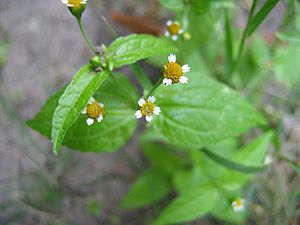Galinsoga parviflora facts for kids
Quick facts for kids Galinsoga parviflora |
|
|---|---|
 |
|
| Scientific classification |
|
| Kingdom: | Plantae |
| Clade: | Tracheophytes |
| Clade: | Angiosperms |
| Clade: | Eudicots |
| Clade: | Asterids |
| Order: | Asterales |
| Family: | Asteraceae |
| Genus: | Galinsoga |
| Species: |
G. parviflora
|
| Binomial name | |
| Galinsoga parviflora Cav. 1796
|
|
| Script error: The function "autoWithCaption" does not exist. | |
| Synonyms | |
|
Species synonymy
Tridax parviflora
Wiborgia parviflora (Cav.) Kunth Adventina parviflora (Cav.) Raf. Baziasa microglossa Steud. Galinsoga hirsuta Baker Galinsoga laciniata Retz. Galinsoga quinqueradiata Ruiz & Pav. Sabazia microglossa DC. Stemmatella sodiroi Hieron. Vigolina acmella (Roth) Poir. Wiborgia acmella Roth Galinsoga semicalva (A.Gray) H.St.John & D.White |
|
Script error: No such module "Check for conflicting parameters".
Galinsoga parviflora is a type of herbaceous plant, which means it has soft stems, not woody ones. It belongs to the Asteraceae family, also known as the daisy family. This plant has many common names around the world. Some of these include guasca in Colombia, pacpa yuyo and waskha in Peru, and gallant soldier or quickweed in the United Kingdom and United States.
Contents
History of the Galinsoga Plant
The Galinsoga parviflora plant was first brought from Peru to Kew Gardens in England in 1796. From there, it spread into the wild across Great Britain and Ireland. For a while, people even called it the 'Kew Weed'.
The plant gets its official name, Galinsoga, from a Spanish botanist named Ignacio Mariano Martinez de Galinsoga. The second part of its name, parviflora, is Latin. It means 'having small flowers', which describes the plant well.
In Britain, some people playfully call Galinsoga "gallant soldiers". This name sometimes changes to "soldiers of the Queen". In Malawi, a country in Africa where the plant now grows naturally, it has a special name. It is known as 'Mwamuna aligone', which means 'My husband is sleeping'.
What Does Galinsoga Look Like?
Galinsoga parviflora can grow quite tall, reaching up to 75 cm (30 in). It is a branched plant with many stems. Its leaves grow in pairs on opposite sides of the stem and have small stalks. The edges of the leaves are slightly toothed.
The plant's flowers are small and grow in clusters called heads. Each flower head has a few white petals, usually between 3 and 8. These petals are about 10 mm (1⁄2 in) long and have three small lobes at their tips. In the center of the flower head, there are many tiny yellow flowers. These central flowers are shaped like tubes.
Where Galinsoga Grows
This plant originally comes from South America. However, it has spread widely and now grows naturally in many other countries around the world. You can find G. parviflora in places like North America and Australasia. There are also some records of it growing in Northern Ireland.
Uses of Galinsoga
Galinsoga parviflora is not just a wild plant; it's also used in cooking! In Colombia, people use it as an herb in a popular soup called ajiaco. Ajiaco is a hearty soup often made with chicken, potatoes, and corn.
You can also use the leaves of Galinsoga parviflora in salads. However, its mild flavor, which reminds some people of artichoke, becomes much stronger and more noticeable after it has been cooked. In eastern Africa, people gather this plant from the wild. They eat its leaves, stems, and flowers. Sometimes, they even dry the plant and grind it into a powder to use in soups.
See also
 In Spanish: Guascas para niños
In Spanish: Guascas para niños
 | Bayard Rustin |
 | Jeannette Carter |
 | Jeremiah A. Brown |

